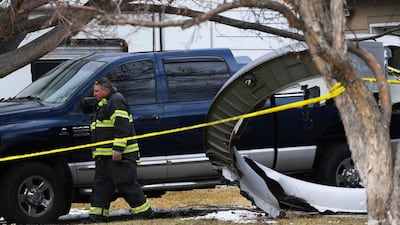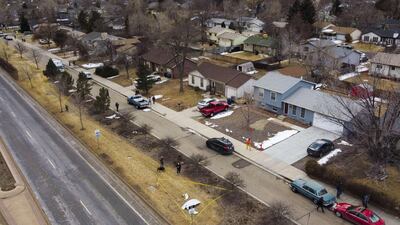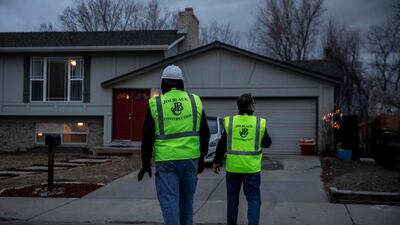Boeing said it supports the decision by Japan's civil aviation authority and the US transportation agency to suspend all wide body 777 models equipped with Pratt & Whitney 4000-112 engines after debris fell from United Airlines Flight.
"While the NTSB investigation is ongoing, we recommended suspending operations of the 69 in-service and 59 in-storage 777s powered by Pratt & Whitney 4000-112 engines until the Federal Aviation Administration (FAA) identifies the appropriate inspection protocol," it said in a statement late Sunday.
"We are working with these regulators as they take actions while these planes are on the ground and further inspections are conducted by Pratt & Whitney."
Japan ordered a halt to all flights of Boeing 777s equipped with similar engines to United which failed over Denver, dropping debris over a Denver suburb but with no reported injuries.
US aviation regulators have ordered emergency inspections of the model’s fan blades. The FAA ordered inspections after examining the hollow fan blade that failed, it said on Sunday evening. The inspections apply to Boeing 777s equipped with PW4000 engines made by Raytheon Technologies' Pratt & Whitney division.
The majority of Boeing 777s are powered by General Electric GE90 and Rolls-Royce Trent 800engines.
On Sunday, Japan’s Transport Ministry ordered ANA Holdings and Japan Airlines to ground Boeing 777 planes they operate after the United Airlines incident. ANA operates 19 planes and JAL 13 with similar engines to that which failed on the United Airlines plane.
United said it would voluntarily halt operations of 24 of its planes while the FAA order was carried out.
FAA administrator Steven Dickson said the aggressive inspections "will likely mean that some airplanes will be removed from service".
A Japan Airlines 777-200 with Pratt & Whitney engines suffered a similar failure on December 4.
"After consulting with my team of aviation safety experts about yesterday’s engine failure aboard a Boeing 777 airplane in Denver, I have directed them to issue an emergency airworthiness directive that would require immediate or stepped-up inspections of Boeing 777 airplanes equipped with certain Pratt & Whitney PW4000 engines," Mr Dickson said.
Separately on Saturday, pieces of metal fell above Meerssen in the Netherlands from a Boeing 747-400 freighter plane bound for New York, after an engine fire shortly following take off from Maastricht, according to Longtail Aviation. Two people were reportedly injured.
"Our flight crew dealt with this situation professionally and in accordance with the correct aviation standards, resulting in a safe and uneventful landing," said Martin Amick, Accountable Manager for Longtail Aviation. "We are now in the process of working closely with the Dutch, Belgian, Bermuda and UK authorities to understand the cause of this incident."
The aircraft continued to fly on 3 engines and landed in Liège. Jumbo 747s are equipped with four engines and can continue flying if one of the engines fails.
"A few seconds after the plane took off, air traffic control found an engine fire and informed the pilots of the plane. They then switched off the engine concerned and sent out an emergency signal," Maastricht Aachen Airport said in a statement.
"What exactly happened that caused the engine fire is not yet clear at this time. The Dutch Safety Board and Aviation Police are investigating this, to which we and the airline are cooperating fully. We want to await these studies and do not want to anticipate the results by speculating."
Boeing, the largest US plane maker, was just turning a corner after the UAE, Canada, the US and Brazil approved over the past two months the return of its 737 Max jets to commercial service, following two fatal plane crashes that led to the global grounding of the aircraft in March 2019.
The crashes in Ethiopia and Indonesia killed a total of 346 people. They triggered a string of investigations and led to reforms in aircraft certification methods and cost Boeing nearly $20 billion.
In January, Boeing posted its biggest annual loss as the Covid-19 pandemic and the 737 Max ban weighed on its business prospects. The company posted a net loss of $11.9bn last year, widening from $636 million in 2019.










